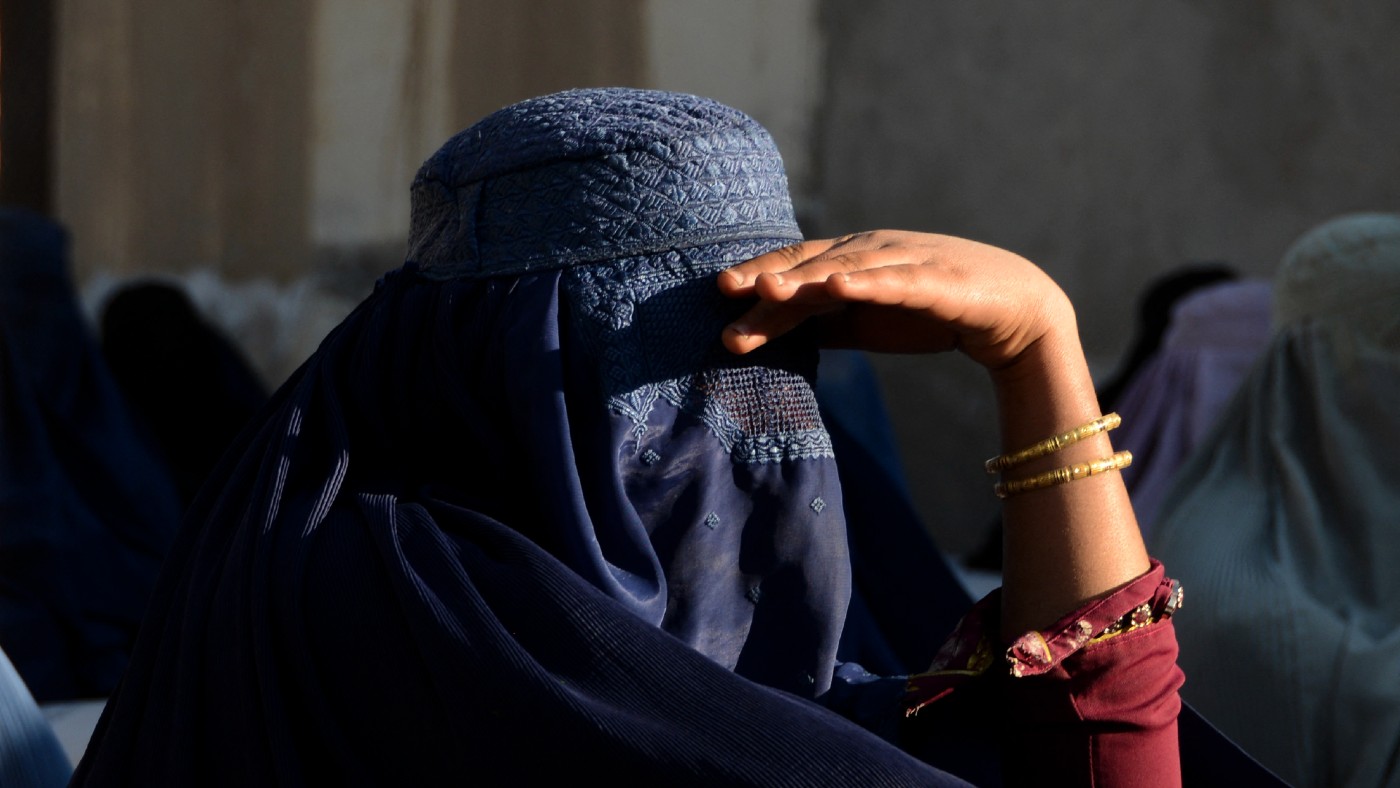How the Taliban is rolling back the freedoms of the past 20 years
Supreme leader has now announced that all women must cover their faces in public

A free daily email with the biggest news stories of the day – and the best features from TheWeek.com
You are now subscribed
Your newsletter sign-up was successful
In Afghanistan, the Taliban’s retrograde and “inhumane” assault on women’s rights is gathering pace, said Hasht-e Subh Daily (Kabul). Women have already been forced out of most workplaces since the Islamist group returned to power in August. They can no longer travel on planes or by taxi without a male escort; in March, the Taliban reversed a pledge to reopen secondary schools for girls.
And last week its supreme leader, Hibatullah Akhundzada, went further, announcing that all women must cover their faces in public, ideally with the head-to-toe burqa. Those who don’t could face jail; government employees will be fired on the spot. Ours is now the only country in the world that forces women to cover themselves entirely in public, a decree based on “their harsh reading” of Islam. Our nation is “broken and sick”. Yet the Taliban is more interested in legislating about “the length of men’s beards and women’s robes” than in facing its problems.
When it first regained power, the Taliban sought to present a more enlightened face to the world, said Rafia Zakaria in Dawn (Karachi). This “Taliban-lite” pledged to honour women’s rights, and forgive those who fought against them. Yet now, with the country isolated abroad and facing a humanitarian crisis caused by sanctions and the withdrawal of foreign aid, its leaders seem to have calculated “that it is better to do what they want and be who they are”.
The Week
Escape your echo chamber. Get the facts behind the news, plus analysis from multiple perspectives.

Sign up for The Week's Free Newsletters
From our morning news briefing to a weekly Good News Newsletter, get the best of The Week delivered directly to your inbox.
From our morning news briefing to a weekly Good News Newsletter, get the best of The Week delivered directly to your inbox.
The regime faces vast problems, agreed Tolo News (Kabul). Its rival Islamic State terror group has carried out a series of deadly attacks in Afghanistan in recent weeks; and the opposition National Resistance Front claims it is regaining territory in parts of the northeast.
Afghans are paying a high price for the Taliban’s incompetence and cruelty, said Sima Samar in Der Spiegel (Hamburg). Hunger is “everywhere”; families are being forced to sell children into marriage just to survive. The burqa decree will perpetuate the imbalance of power between women and men; despite the risks, women’s rights activists protested the decision in Kabul.
The international community seems powerless to influence the regime, said Lynne O’Donnell in Foreign Policy (Washington). Following March’s schooling decision, the World Bank suspended $600m of aid earmarked for education, health and agriculture in Afghanistan. But the Taliban “haven’t budged”. The burqa edict suggests the group is determined to roll back the freedoms enjoyed by millions of Afghans over the past 20 years, and to treat women’s bodies as “the property of the state”.
A free daily email with the biggest news stories of the day – and the best features from TheWeek.com
-
 6 of the world’s most accessible destinations
6 of the world’s most accessible destinationsThe Week Recommends Experience all of Berlin, Singapore and Sydney
-
 How the FCC’s ‘equal time’ rule works
How the FCC’s ‘equal time’ rule worksIn the Spotlight The law is at the heart of the Colbert-CBS conflict
-
 What is the endgame in the DHS shutdown?
What is the endgame in the DHS shutdown?Today’s Big Question Democrats want to rein in ICE’s immigration crackdown
-
 Corruption: The spy sheikh and the president
Corruption: The spy sheikh and the presidentFeature Trump is at the center of another scandal
-
 Putin’s shadow war
Putin’s shadow warFeature The Kremlin is waging a campaign of sabotage and subversion against Ukraine’s allies in the West
-
 The fall of the generals: China’s military purge
The fall of the generals: China’s military purgeIn the Spotlight Xi Jinping’s extraordinary removal of senior general proves that no-one is safe from anti-corruption drive that has investigated millions
-
 Epstein files topple law CEO, roil UK government
Epstein files topple law CEO, roil UK governmentSpeed Read Peter Mandelson, Britain’s former ambassador to the US, is caught up in the scandal
-
 Iran and US prepare to meet after skirmishes
Iran and US prepare to meet after skirmishesSpeed Read The incident comes amid heightened tensions in the Middle East
-
 Syria’s Kurds: abandoned by their US ally
Syria’s Kurds: abandoned by their US allyTalking Point Ahmed al-Sharaa’s lightning offensive against Syrian Kurdistan belies his promise to respect the country’s ethnic minorities
-
 Israel retrieves final hostage’s body from Gaza
Israel retrieves final hostage’s body from GazaSpeed Read The 24-year-old police officer was killed during the initial Hamas attack
-
 China’s Xi targets top general in growing purge
China’s Xi targets top general in growing purgeSpeed Read Zhang Youxia is being investigated over ‘grave violations’ of the law